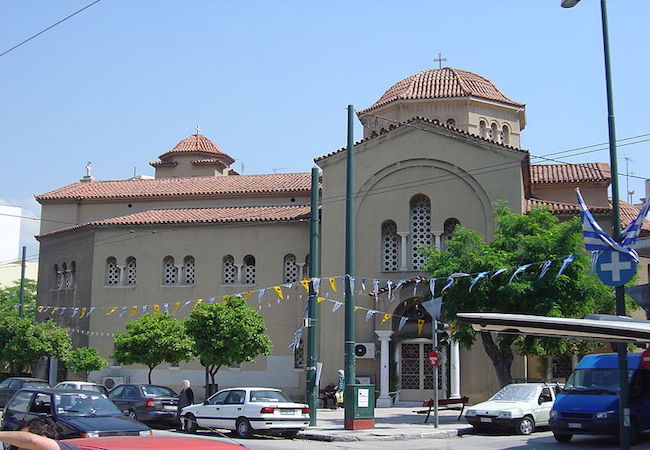
By Dr. Lisen Bashkurti
For thousands of years, Albanians and Greeks have shared a common geography, history, culture, traditions, values and innumerable interests. Albanians and Greeks are the oldest foundations and have continually been the most consolidated nations in the Balkans.
Moreover, these two nations have co-existed in peace and cooperated throughout centuries. With a complete certainty it can be said that the co-existence between Albanians and Greeks has survived many great and fairly long historical challenges, while never generating destructive conflicts upon their people and assets.
Megali-Idea
The first problems among Albanians and Greeks took place from the Megali-Idea Doctrine of Greek Nationalism at the beginning of the XIX Century. The Megali-Idea Doctrine aimed at expanding the Greek nation-state in the East-European geopolitical territories that were inhabited by people that professed Eastern Orthodoxy religion. With these ambitions the architects of Greek Nationalistic Doctrine aspired to establish their state in the largest part of the Former Byzantine Empire.
Megali-Idea was not solely a doctrine; it also became a revolutionary movement. The first revolutionary campaign started in the outskirts of Romania’s regions, but it failed thanks to the counter attacks of Romanian resistance fighters. The second revolutionary campaign took place nearby Istanbul; this attempt was also badly crushed due to a major counter offensive led by the Ottoman Empire Army.
While they completely failed in territories relatively far from Greece, leaders of Greek Nationalism unraveled their third revolutionary stage in the Peloponnese Peninsula. In 1820-1829 the Greek revolutionary movement was supported by the Arvanits, indigenous Albanians in Greece that raised the fighting spirit and stamina within the Greek Army, who also gave their lives and invested almost 90 percent of Greek war heroes as well as invested important statesmen to the foundation of the Modern Greek nation.
The Doctrine of Megali-Idea started a new fight against the Slavs in the Balkans. A new conflict surged between Bulgarians and Serbs, because they belonged to the Eastern Orthodox religion, but they had a Slavic language, culture and identity. Megali – Idea had encountered a greater problem with the Russians, who were also part of the Orthodox Church, but they had a Slavic identity, language, culture and were a very large nation; Russians had amassed great benefits and been equipped with significant geopolitical interests. The Megali-Idea had completely failed within the territories of Southern Slavs and Russian Slavs.
Northern Epirus
After the failure of Megali-Idea, Greek nationalists were strengthening their nationalist doctrine on regions that were ever more close to their neighborhood. Within these territories Megali-Idea would become a Micro-Idea, while being directed specifically towards Albanian population in northern Greece.
This is why the geopolitical orientation of Greek national doctrine was named after northern Epirus. Megali – Idea of Northern Epirus was expanded during the Balkan Wars (1911-1913) and was developed during the First World War (1914-1918). On this phase begins a massive ethnic cleansing against Albanian population of Chameria, who were an indigenous ethnic group over a large swath of territory with over 13 thousand square kilometers.
The genocide and ethnic cleansing against Albanians of Chameria reached its apex during the Second World War (1943-1945) when the Greek Fascist Monarchy, under the consent of a major power at the time, massacred about five thousand Albanians of Chameria and violently displaced thousands of Albanians towards the mainland.
Crypto-Northern Epirus
In consideration to its geostrategic aspects, the Greek nationalist doctrine has not been changed towards the Albanian nation. In 1949 Greek Armed Forces attacked Albanian sovereign territories in its south eastern regions. From 1945 until 1955 Greece blocked the Albanian membership to the United Nations. Such a situation had left both countries, Albania and Greece without any diplomatic relations until 1971, a time when Athens was under the Regime of the Colonels.
Crypto-Northern Epirus even continued after the integration of Greece to the European Union. Behind a curtain of European terminology and contemporary soft diplomatic language the doctrine of Northern Epirus has remained unchanged towards Albania and Albanians.
Diplomacy under stagnation
In our days there are three major sets of problems: there are problems inherited from history, at their center are the issues of Chameria; there exist problems of democratic transition in the Balkans, where immigration, corruption and illegal trafficking are the main concern; there are currently some problems that are very serious in terms of defining a border line between Albania and Greece that would cross the waters of the Ionian and Aegean Seas.
These sets of problems have been accumulated on the diplomatic files of both nations, meanwhile there are no real efforts made to solve them.
We see: high level meetings, public press releases, ambassadors giving interviews, but all of these optimistic actions are not followed-up by the respective negotiating diplomatic teams that could move step by step and bring lasting solutions that are necessary for both governments, nations and throughout the Balkans.
Only recently the Greek Ambassador to Tirana gave an interview. In her public appearance the Greek diplomat stated clearly that her nation’s foreign policy does not recognize the truth of Albanian genocide and ethnic cleansing against Albanian people of Chameria and she estimates that the bilateral border line over the Ionian-Aegian Seas is solved.
In regards to Chameria, this issue is still open. Albanian and Greek Diplomatic channels must consider it seriously and within a permanent negotiating attitude and not in a fragmentary and in a statement-like behavior. Chameria requires long and serious negotiations.
According to the border line on the coast line, the draft agreement signed by the two Ministers of Foreign Affairs in 2009 was considered anti-constitutional by the Constitutional Court of the Republic of Albania. In respect to the legal consequences the agreement of 2009 is null.
A totally new process of negotiations is needed between Albania and Greece in order to draft a brand new bilateral agreement.
Translated from Albanian by Peter Tase




